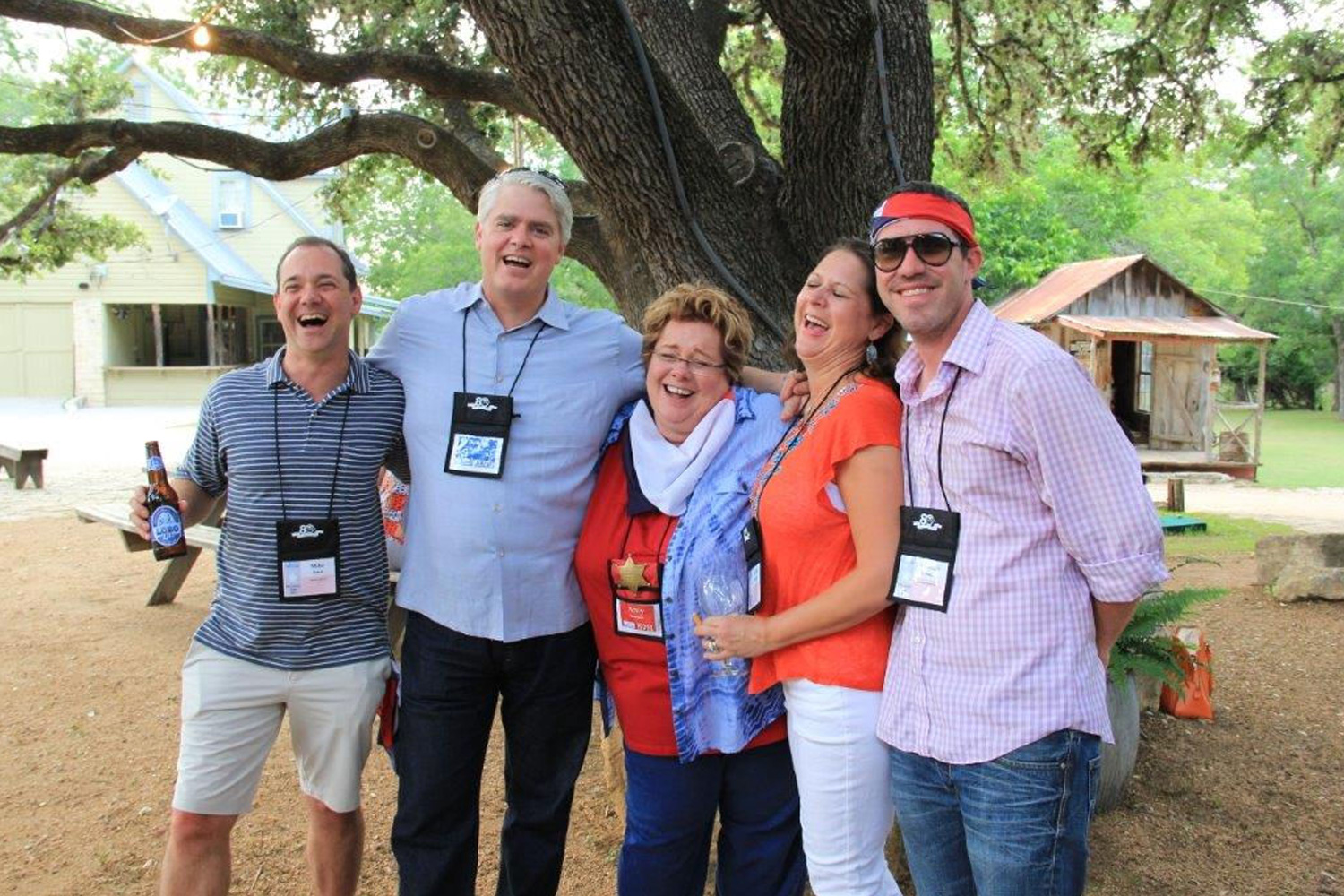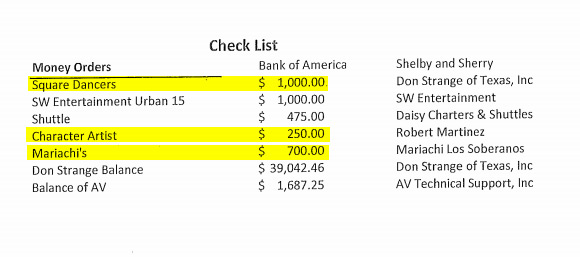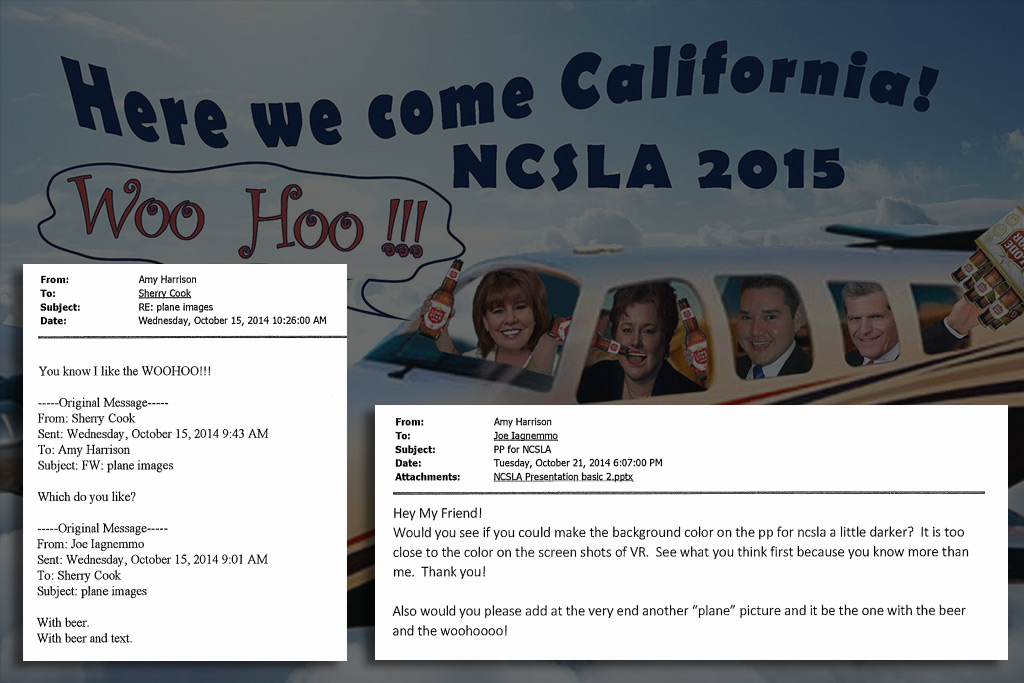/https://static.texastribune.org/media/images/2017/04/04/TABC-IsaacRomero-002.jpg)
The jet-setting brass of the Texas Alcoholic Beverage Commission, which has spent tens of thousands of taxpayer dollars attending meetings and hosting conferences that featured open bars, mariachis and square dancers — largely paid for with liquor industry money — is facing some buzz-killing proposals in the Texas House of Representatives.
State Rep. Jason Isaac, R-Dripping Springs, and Rep. Ramon Romero, D-Fort Worth, this week filed amendments cutting off future out-of-state travel by TABC. Isaac would also restrict state liquor regulators from using money from outside groups that are funded largely by the liquor industry, such as the National Conference of State Liquor Administrators (NCSLA).
The lawmakers said they decided to move forward with the amendments after reading about the agency's controversial spending practices in the Texas Tribune. Isaac said reports on TABC’s spending are particularly offensive at a time when Republican Gov. Greg Abbott has asked state agencies to reduce their budgets by 4 percent. The Texas governor appoints the three-person board that oversees the TABC.
“Having these out-of-state expenditures from TABC to travel to Hawaii is just absurd,” Isaac said. “They are spending other people’s money — the people that they’re supposed to work for and protect.”
The wing-clipping amendments by Isaac and Romero, offered as modifications to the multi-billion-dollar state budget, are up for consideration on the floor of the Texas House Thursday.
Mariann Morelock, the agency's director of communications and government relations, said in an emailed statement that TABC would adhere to any orders from the Texas Legislature.
"Like any state agency, TABC serves at the behest of Texas' elected officials," Morelock said in the email. "We have always and will continue to work within the travel guidelines established under state law, including any new statutes approved by the 85th Legislature."
The Tribune reported that TABC spent more than $10,000 on a 2013 trip to Hawaii and another $8,000 on a 2015 trip to San Diego — both so that top agency officials could attend meetings of the National Conference of State Liquor Administrators. The national organization, funded in large part by the liquor industry, also chipped in about $2,000 to reimburse TABC for some of the travel expenses for the Hawaii trip, records show.
In addition to the standard panel discussions about industry trends, the out-of-state confabs generally feature open bar “hospitality rooms,” live entertainment, cocktail parties, banquet-style dinners and various tourist or leisure activities.
Recent out-of-state trips not previously reported by the Tribune include a 2013 jaunt by TABC honchos to Atlantic City, where they stayed at the Revel casino and organizers offered a golf outing and cocktail party at Sea Isle City; then a quick run in 2014 over to Palm Harbor Florida, where top TABC bureaucrats cooled their heels at the Innisbrook Golf and Spa Resort. NCSLA social festivities in the Sunshine State included a golf tournament, a trip to the beach at Honeymoon State Island Park and a visit to the Hard Rock Casino.
As with the Hawaii and San Diego junkets, taxpayers were billed thousands of dollars for the trips to Atlantic City and Palm Harbor.
"They need to focus their attention on cracking down on bad bars, cracking down on human trafficking, sex trafficking, underage drinking, those things," said Romero, the Fort Worth Democrat who joined Isaac in seeking a ban on such expenditures. "I don't know why those things need to be in Hawaii or San Diego ... I'd rather see us hire people to crack down on the issues that are affecting our state and not be out there just blowing money to expand their networks."
It’s not just the out-of-state conferences that are eating up tax dollars and liquor money. The TABC spent at least $28,000 in taxpayer money so 17 employees could take part in an NCSLA conference the agency hosted in San Antonio three years ago, state financial records show.

Recently obtained records detail all the planning and money that went into staging an NCSLA regional conference held in Austin last year. Most of the money came from the liquor industry, TABC documents show.
Isaac wants to cut that off, too.
“To be that close to the industry that you’re regulating, as executives of an agency, is just unacceptable,” Isaac said. “This is just government at its worst. This is exactly what people are fed up with.”
According to the documents, the NCSLA money was used to pay for food, drinks and entertainment. Among the items budgeted: booze and associated fare for an open bar (at least $1,500), square dancers (at least $1,000), Mariachi singers (at least $700), and a "character artist" (at least $250), according to TABC records. The documents show that 70 percent of the $75,000 in revenue raised directly for the Austin event came from liquor industry “associate members,” which includes alcohol manufacturers, distributors, retailers and lobbyists.

Morelock distanced the TABC from the money used to pay for the Austin conference and said the agency was unable to provide cost breakdowns for entertainment at the event. In her statement she said the TABC does not have "financial ties" to NCSLA and was not "directing or spending any proceeds from NCSLA funds."
The explanation from TABC does not jibe with NCSLA bylaws and financial documents in the agency's custody, however.
Records obtained by the Tribune show TABC Executive Director Sherry Cook, who sits on the NCSLA board, was given an NCSLA debit card last year to help stage the Austin conference. She was also listed as a signatory on a $75,000 line of credit at the Radisson Hotel & Suites, where the event was held in late September. And numerous emails indicate Cook and other TABC employees were involved in the planning and oversight of the conference — everything from setting the fee for conference guests to manning the registration desk and hospitality room.
NCSLA's own bylaws also make it clear that the event's host administrator "shall have authority as an agent" of NCSLA to negotiate contracts for goods and services to stage the event. TABC called itself the "host" of the conference in its own advertisements and NCSLA records in TABC's possession names "Texas" as the "host administrator" for the Austin conference.
In her emailed statement, Morelock did not answer a question about whether Cook still had an NCSLA debit card. She said "all records regarding the debit card and bank statements are in the care and custody of NCSLA." She said "no TABC money" was used to stage social events, but did not answer questions about the government resources and employee time expended in the process of putting it all together.
Emails and calls to NCSLA leaders were not returned.
The Tribune previously reported that the financial ties between NCSLA and Cook may not have been properly disclosed under ethics and state transparency laws.
Though Cook has accepted numerous NCSLA travel reimbursements for out-of-state trips, she did not report the payments on the personal financial statements that she and other top state officials are required to file with the Texas Ethics Commission.
Through a spokesman, Cook said last month that Ethics Commission officials told her the reimbursements “should have been reported” and were working with her to correct the "oversight." That answer changed Tuesday, when Morelock said that to "ensure that all reporting requirements are being met, Ms. Cook is sending a request for an opinion to the Texas Ethics Commission concerning NCSLA reimbursements."
The agency listed several lobbyists and liquor lawyers as potential participants in an internal committee to decide the one meaty piece of the convention — the "business agenda" — including Dewey Brackin, a liquor lawyer and lobbyist whose clients have included Anheuser-Busch; Tom Spilman, lobbyist for the powerful Wholesale Beer Distributors of Texas; Tyler Rudd, lawyer and lobbyist for the California Wine Institute; and California liquor lawyer K.C. Branch.
Ultimately, Spilman did not participate in the internal TABC committee, Morelock said. She called the TABC panel a "cross-section of stakeholders (industry members and regulators) selected to design a business agenda that addresses current topics and events."
Morelock said Tuesday that the NCSLA conferences benefit Texas "in the form of learning about new trends, current litigation, approaches to public safety and enforcement, technological advancements to increase efficiencies, and best practices of alcoholic beverage industry." She called the economic impact of hosting conferees from out of state "an added benefit."
Isaac, the Republican from Dripping Springs, said if regulators need liquor industry money or can’t get their training and networking done in Texas, then they shouldn’t be involved in it.
His amendment is aimed at shutting the party down — both in state and outside of it. It says the liquor regulators can't spend money in the next two year budget on "travel outside the state, other than for bonafide and documented law enforcement or investigative activities." Romero’s amendment places a flat ban on any TABC travel outside state borders.
Another provision in Isaac’s amendment would instruct the TABC that it could not longer "accept payments from or spending authority on behalf of" groups such as the NCSLA or other industry trade or professional organizations.
Beyond the direct cost of out-of-state travel, Isaac said the TABC is spending way too much time and too many precious government resources on the conferences. He said he was particularly shocked to learn that TABC officials used government computers and employee time to create a humorous graphic depicting officials’ jet-setting and partying at an NCSLA event.
"Here we come California!" reads the caption above the doctored picture that portrays agency director Sherry Cook and other agency honchos riding in a plane while holding or guzzling from bottles of Lone Star Beer. "Woo Hoo!!!"

The graphic was intended to serve as comic relief in a Power Point presentation at a 2014 NCSLA conference in Palm Harbor, Florida, Cook told the Tribune last month. She also said the final version shown at the conference did not include the beer and the “Woo Hoo!!!” inscription — even though emails suggest that was the plan.
“Which do you like,” Cook asked her licensing director on a Wednesday morning in late 2014. Cook had forwarded two images, one “with beer,” and the other “with beer and text.”
The licensing director expressed a preference for the latter.
“You know I like the WOOHOO!!!” she wrote.
Isaac said he might expect to see a flier like that being used in a direct mail piece during a mud-slinging political campaign — but never state liquor regulators "doing it themselves, internally."
“Photoshop and some of these photo editing tools are not cheap and if they’re using those dollars for this — wow," Isaac said. "It’s really, really disappointing.”
Information about the authors
Learn about The Texas Tribune’s policies, including our partnership with The Trust Project to increase transparency in news.
/https://static.texastribune.org/media/profiles/Jay_at_Cloak_TT.jpg)